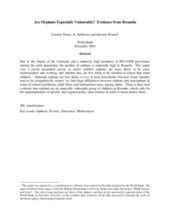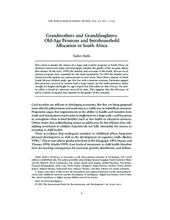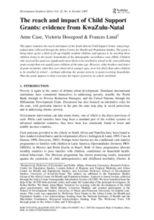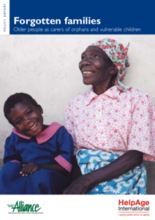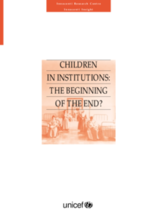Displaying 14041 - 14050 of 14391
Provides an overview of social service provision in Eastern Europe and Central Asia, and provides information on ways to move resources away from institutional care, and into community-based social services. Contains specific examples from Latvia, Iceland, Sweden, Romania and other transitioning countries.
Contains practical tools and policy guidance for family and child welfare policy makers and practitioners. Relevant topics include gatekeeping, redirecting resources into preventive and family based services, and standards of care.
This research paper explores the condition of orphaned children in Rwanda. The paper urges the design of appropriate social protection mechanisms, including differentiated policy responses, conditional cash transfers and increased access to education.
This research paper discussed the impact of the South African old-age pension program, or cash transfer, on the health of children living with an eligible recipient. It finds that both gender of the recipient and gender of the child living with the recipient are factors in health outcomes.
This research paper evaluates the impact of the Child Support Grant in South Africa. It finds that while there exists a strong commitment to implementation, the presence of a child’s mother is an important factor in program participation.
A brief policy report which highlights issues faced by older caregivers of orphans and vulnerable children in Africa. Outlines NGO responses, challenges and recommendations for programmatic support of older caregivers. Includes statistical data on ageing, HIV/AIDS and kinship care in Africa.
A paper discussing the shortcomings of systems in which separated children are placed into residential/ institutional forms of care. It also considers community-based and some other forms of care as alternative approaches to preventing unnecessary separation of children from their families.
A statement, by UNICEF for the Stockholm Conference on Residential Care, which recommends a move away from institutional care for children and offers the ‘protective environment’ framework as a solution which encourages protective legislations and policies, public debate, government commitment and the need to listen to the children. The statement includes lessons learned about the issue of children without family care and recommendations for reform.
This publication provides an account of historical processes in Spain and Italy which have led to a transformation of social child protection policies and an abandonment of the most widely-used mechanism of social exclusion, namely institutionalization.
A sample survey designed to be used in interviewing parents and guardians of children ages six to twelve years old. The questions assess household financial security, socio-demographic and community characteristics, psychosocial intervention exposure, income generation intervention exposure, health status, HIV/AIDS prevention exposure, legal rights, and coping skills. Includes sample consent form.



